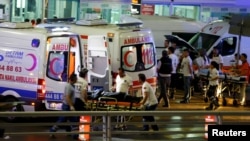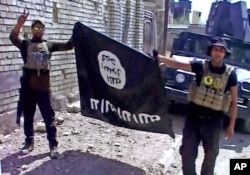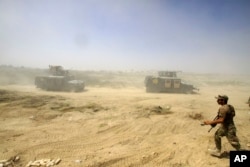U.S. lawmakers emerged from a classified briefing by top national security officials Wednesday, saying Islamic State is more determined to strike soft targets around the world, including in the United States, as its battlefield setbacks mount in Iraq and Syria.
One day after deadly suicide bombings in Istanbul, Turkey, the entire U.S. Senate paused to confer behind closed doors with Defense Secretary Ash Carter, Joint Chiefs of Staff Chairman Joseph Dunford and National Center for Counterterrorism Director Nicholas Rasmussen.
"As long as ISIS continues to lose ground, I anticipate you'll see more efforts to both inspire attacks abroad, like what we saw in Orlando, and to direct them, like what we saw yesterday in Istanbul," said Republican Senator and former presidential candidate Marco Rubio of Florida, using an acronym for Islamic State. "It's a challenging task [to combat the threat]."
"ISIL is on the run, which makes it more important that we protect the homeland," concurred Democrat Chris Murphy of Connecticut, using another acronym for the terror group. "There is no doubt that ISIL is now more focused than ever on trying to inspire lone wolf attackers, and we can absolutely do more."
No easy answers
Another Democrat, Dick Durbin of Illinois, said officials made clear at the briefing that there are no easy answers.
"They talked about the fact that some people who are motivated and inspired by ISIS are inspired in their minds, reading internet posts," Durbin said. "It's very hard, unless someone sees something that is out of the ordinary, to spot that, sometimes until it's too late."
"I think we can do a better job [countering Islamic State]," he added.
Earlier in the day, CIA Director John Brennan warned of Islamic State's ability to carry out attacks, saying suicide bombings are especially difficult to prevent.
Durbin said that while the group behind the attack at Istanbul's airport has not been conclusively identified, concerns have been raised about the vulnerabilities of major U.S. airports, including Chicago's O'Hare in his home state.
Holding Iraq, Syria
Several Republican senators urged greater attention to conditions in Iraq and Syria, as part of an overall strategy to keep the United States and its allies safe.
"I'm glad we liberated Fallujah [Iraq]. Ramadi [Iraq] has been liberated for quite a while," said Senator Lindsey Graham of South Carolina. "[But] you have to hold the territory you liberate. If we don't invest in these territories once they are liberated, they are going to fall back into the enemy's hands."
Graham said he is working with a Democratic colleague, Barbara Mikulski of Maryland, on a multibillion-dollar proposal to speed U.S. aid to territories in Iraq and Syria from which Islamic State has been expelled.
Graham's reasoning was echoed by Murphy.
"You can't take territory you can't hold. And we are not going to move on places like Raqqa and Mosul until we know we have the ability to hold those areas," Murphy said.
"The Achilles heel [weak point] is Syria," Graham said. "You'll never end the war in Syria until you deal with [President Bashar al-] Assad. Assad is stronger today than he was last year, and there is no game plan, in my view, to knock Assad out of power. And as long as he's in power, he's a puppet of Iran and this war never ends."
"The underlying dynamic that led to the rise of ISIL has not been addressed, which is political reconciliation in Iraq and ending the civil war in Syria," he added.
Rubio sees an even bigger challenge.
"It is important not just to defeat ISIS, but to defeat the radical Islamic ideology that underpins it and that they use to justify what they do," the Florida Republican said.






